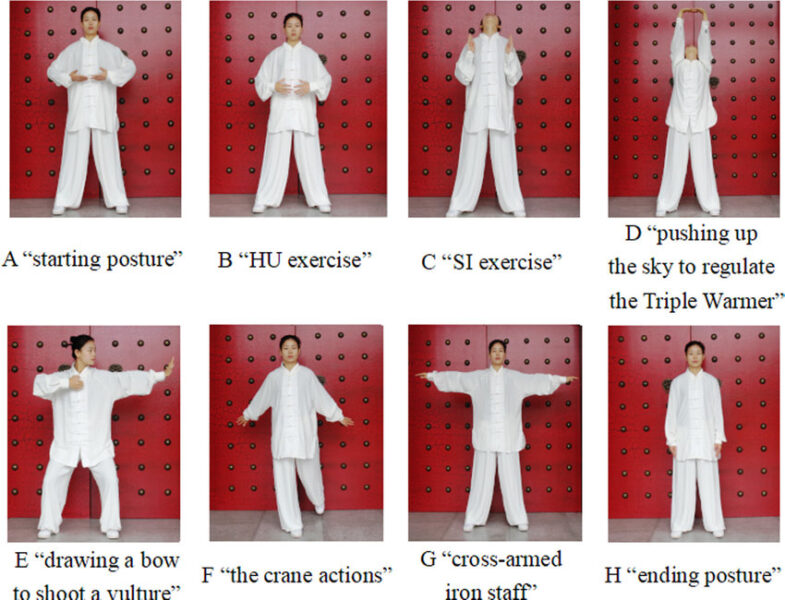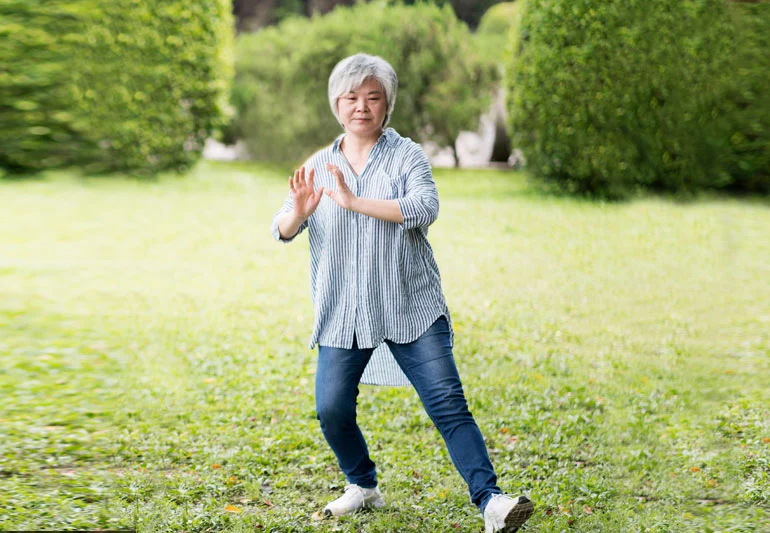Qigong is an ancient Chinese practice involving mental and physical exercises that promote a balanced lifestyle between the mind and body. The word “qi” means “life force” or “energy,” and “gong” means “practice” or “skill.” The English translation of qigong is “skillful practice of energy” or “cultivation of life energy.”
This technique is based on the concept of qi, which is believed to flow through the body along pathways called meridians. The body and mind are balanced and healthy when this energy flows freely. However, when energy flow is blocked, sickness and disease can occur. Qigong for pain relief exercise is designed to remove these blockages and promote the free flow of energy throughout the body.
This involves a combination of physical postures, breathing techniques, meditation, and visualization. These practices help practitioners focus their minds, increase their energy levels, and strengthen their bodies. Let’s discuss how qigong helps the mind and body.
Qigong Posture For Mind And Body

Source: researchgate.net
Many postures can benefit the mind and body, but one of the most fundamental is known as Wuji (pronounced “woo-jee”) posture. Here’s how to practice it:
- Your toes should be pointing straight ahead when you stand with your feet shoulder-width apart.
- Your feet should be equally spaced apart, and your knees should be slightly bent.
- Let your arms lie lightly at your sides and relax your body.
- Your chest should be slightly sunken, and your shoulders should be relaxed.
- Consider a thread tugging your head upwards and lengthening your spine as you tuck your chin slightly.
- Focus on your breath and the sensations in your body as you take long, deep breaths.
- Just below your navel, see a ball of energy growing in your lower abdomen. This is your body’s “qi,” or life force.
- Imagine this ball of energy growing and filling your entire body, giving each cell life and harmony.
- Hold this position for a few minutes while inhaling deeply and concentrating on your physical sensations.
Wuji posture is a simple but powerful way to connect with your body’s vital energy and cultivate greater awareness and relaxation. It can be practiced independently or as a foundation for other Qigong movements and exercises.
Encouraging Flexibility And Fitness

Source: verywellfit.com
Qigong that focuses on body postures and movement is Baduanjin qigong. In a review published in 2016, scientists examined earlier data to determine how this exercise can impact general fitness. They discovered proof that Baduanjin qigong could enhance:
- Body posture
- Hand grasp capability.
- Torso strength.
- Blood pressure.
- Heart rate during rest.
Studies on both younger and older persons found that these advantages occurred. Qigong is a relatively low-impact exercise, making it a good option for people with little strength or capacity.
Breathing With Qigong

Source: qigongawareness.com
Dantian breathing is a well-known example of qigong breathing. Some believe Dantian to be crucial for quietly encouraging health and fitness. In qigong, the stomach comes first, followed by the chest. Additionally, we breathe through our noses as opposed to our mouths. Use the following instructions to develop your qigong breathing:
- On your stomach, place your palms.
- As you inhale deeply through your nose, allow the abdomen to expand.
- Imagine your belly button moving toward your spine as you breathe.
- Permit the stomach to tighten.
- Imagine that this technique softly massages the internal organs and permits the lungs to absorb more oxygen than shallow chest breathing.
- Do not restrict or contract the chest.
- As you inhale, it’s acceptable if your chest also expands. Instead of actively repressing your body’s natural urges, pay attention to them.
This breathing is a powerful tool for promoting physical and mental health and well-being. By incorporating this practice into your daily routine, you can experience a wide range of benefits that can help you to feel more energized, focused, and relaxed.
Qigong Meditation
Qigong meditation is a traditional Chinese practice that involves slow, gentle movements, deep breathing, and meditation to promote physical and mental health. You can try meditation techniques for mind and body:
- Sit comfortably, inhale through your nose, and exhale through your mouth.
- Pay attention to your breathing. Relax your mind.
- Your feet shoulder-width apart with your knees should be slightly bent as you stand.
- Loosen your body and put your eyes closed.
- Sense the positive vibes moving through your body, from your toes to your head.
- Focus on your respiration while moving slowly. These motions include arm waving, body twisting, or back-and-forth rocking.
- Imagine a peaceful scene, such as a forest or the water, while closing your eyes.
- Maintain focus on the details of the situation while allowing yourself to relax.
- Sit or stand quietly and focus on peaceful sounds like a lulling river or birds chirping. As the song washes over you, let it soothe your body and mind.
Qigong meditation can help reduce stress, improve balance and flexibility, and enhance overall well-being. However, it’s important to learn qigong from a qualified instructor to ensure proper technique and avoid injury.
The Advantages Of Qigong For Mental Health

Source: health.clevelandclinic.org
Qigong is a practice for the body and mind that goes beyond physical health and wellness. It includes exercises, mindful awareness, meditation, and controlled breathing—all commonly linked to stress reduction and mental health. According to numerous research, qigong practice helps relieve the symptoms of worry and depression. Qigong can boost mental health by activating the parasympathetic nervous system, the part of the nervous system that encourages rest.
Physical Health Advantages Of Qigong
The scant research indicates that qigong might benefit several areas of health. Qigong could relieve several types of pain, particularly chronic pain. According to a report published in 2020, this technique may be helpful for older persons who want to lower their risk of acquiring COVID-19 supplemental therapy. According to the researchers, various qigong breathing practices may: Stress reduction and respiratory muscle development, decrease inflammation, and boost the immune system.
Conclusion
The traditional focus of qigong is on the mind, body, and spirit. It is derived from traditional Chinese medicine and philosophy, and its goal is to ensure that a person’s qi, or life force, flows freely throughout their body. Due to its emphasis on mindfulness, breathing techniques, and physical movement, some experts think qigong may positively affect physical and mental health. Some may discover that qigong helps them stay healthy and active, reduce stress, and improve chronic symptoms like pain.




